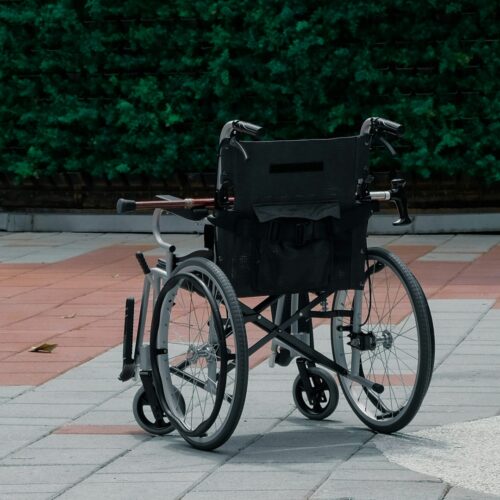For many, the initial shock can lead to the misconception that a fulfilling and impactful life is no longer possible. However, the human spirit is remarkably resilient, and countless individuals defy such expectations daily; and you can too.
Beyond adversity: Redefining success post-SCI
We understand that the path to recovery and renewed purpose can look different for everyone post-SCI. This often involves significant challenges, including the persistent discomfort of spinal cord injury nerve pain and general spinal cord injury pain.
Fortunately, advancements such as spinal cord stimulation for chronic pain are continually improving the quality of life for many, enabling them to focus on their ambitions and contribute meaningfully to society.
While sometimes it may feel deflating living with a SCI, it’s important to remember how far you have come, and often, recognising the achievements of others so far (and setting your own goals) can leave you feeling motivated once more.
In this article, we aim to showcase some of the success stories of individuals who have achieved great things as a powerful testament to courage, determination, and the unwavering belief that life after SCI can be just as, if not more, impactful. We’ll also explore how, with Aspire Law, you can gain access to the compensation you deserve, to ensure that you have the support you need to fulfil your dreams.
Notable figures who broke barriers
Throughout history, remarkable individuals have demonstrated extraordinary resilience, completely shattering societal (and often medical) expectations.
Sophie Carrigill
Sophie Carrigill is an elite athlete who understands the power of her platform and representation of people with SCI on the global stage. As a member of Great Britain’s wheelchair basketball team and an ambassador for Sweaty Betty, a women’s activewear brand, Carrigill is passionate about changing the way people see disabilities.
After waking from a coma after a car accident that left her unable to walk, Carrigill didn’t want to give up her guiding passion: sport. She went on to become co-captain for Team GB at the Rio Paralympics in 2016. Her achievements have inspired countless individuals to give sports a try, regardless of their ability.
George Robinson
Most recognisable for his role in Netflix’s hit series ‘Sex Education’, actor George Robinson is challenging perceptions of disabilities one episode at a time.
After a rugby accident left him a quadriplegic, he’s been proactive in accurately reflecting the disabled experience, so that people with SCI can see themselves more authentically portrayed on screen. Robinson was involved in the creative process behind ‘Sex Education’ and is also developing a comedy series that spotlights a “disabled vigilante”.
Additionally, the actor is an ambassador for the award-winning Horatio’s Garden, which is a therapeutic garden for patients at the Princess Royal Spinal Injuries Centre. Designed by RHS Chelsea Flower Show gold medal winners Hugo Bugg and Charlotte Harries, this garden is built to be an accessible sanctuary from the hospital environment of the ward and has been transformative for rehabilitation.
Louise Sugden
Louise Sugden has spent her life proving other people wrong. At 9 months old, Louise Sugden was left injured after a car accident, meaning she has never known a world without her injury. Describing herself as “fiercely independent, stubborn and determined”, Sugden continues to exceed expectations and defy boundaries.
She has gone on to compete in two different Paralympic sports, including wheelchair basketball and powerlifting, for which she has been decorated with Bronze and Silver medals, as well as competing for Great Britain around the world. Her mantra is: “If you want to do something, you’ll find a way to do it.”
Christopher Reeve
Beloved for his iconic portrayal of Superman, Christopher Reeve’s life took a dramatic turn in 1995 after a severe horse riding accident left him paralysed from the neck down. Refusing to be defined by his injury, Reeve dedicated his life to advocating for spinal cord injury research and improving the quality of life for those with paralysis.
He established the Christopher Reeve Foundation (now the Christopher & Dana Reeve Foundation), becoming a prominent voice for disability rights and a tireless fundraiser.
Gavin Walker
Gavin Walker, a dedicated firefighter, sustained a spinal cord injury later in life, yet he point-blank refused to let this define him. During his rehabilitation, he discovered the sport of wheelchair rugby and quickly embraced the new opportunities it offered.
Since then, Gavin has competed in two Paralympic Games, Rio 2016 and Tokyo 2020, showcasing his incredible athletic abilities. Beyond his sporting achievements, Walker is a passionate advocate for adaptive sports, frequently highlighting their profound impact on both mental and physical well-being.
Be inspired by SCI role models
One of the most crucial aspects of seeing public figures with spinal cord injuries is the sense of connection they foster. Dealing with an SCI, particularly in its initial stages, can feel incredibly isolating. However, simply knowing that someone you admire has confronted and overcome similar challenges can provide a huge amount of comfort.
These role models provide a safe space for SCI communities to blossom, feel seen and understood, helping to diminish feelings of isolation.
Why representation matters
It really matters how people with spinal cord injuries are shown in the media. Whether it’s in films, TV shows like ‘Sex Education’, or even on social media, the way this disability is presented can totally change how society sees it.
Take documentaries like ‘Super/Man: The Christopher Reeve Story’ and ‘Murderball’. They tell real stories about people with different levels of spinal cord injuries and how they’re fighting to make the world a better place.
While some fictional stories, like ‘Me Before You’, might not always get it right when it comes to showing SCI, it feels like society is certainly making progress in the right direction. We’re pleased to say that there are more and more positive and real portrayals of people with spinal cord injuries appearing in mainstream media.
Find support with Aspire Law
As we’ve seen with the examples above, from the unwavering advocacy of George Robinson to the encouraging accomplishments of Louise Sugden, individuals with spinal cord injuries continue to redefine what’s possible.
At Aspire Law, we are deeply committed to supporting individuals with SCI, helping them to navigate the complexities that arise and empowering them to achieve their full potential. We can assist you in securing the compensation you deserve, facilitating access to vital rehabilitation services, and much more, ensuring you have the support needed for a fulfilling life.
We don’t believe SCI should hold you back. Take a look at the services we offer or get in touch with a member of our specialist team today to learn more.



